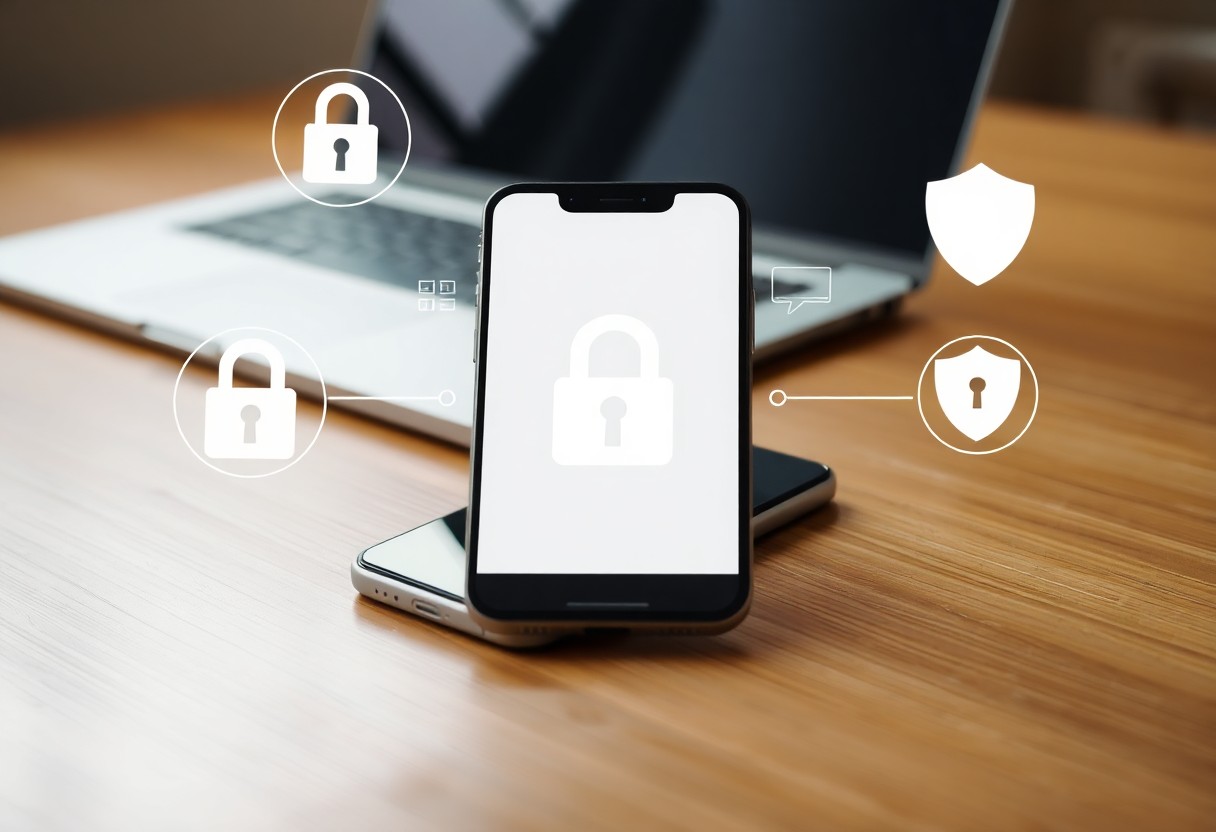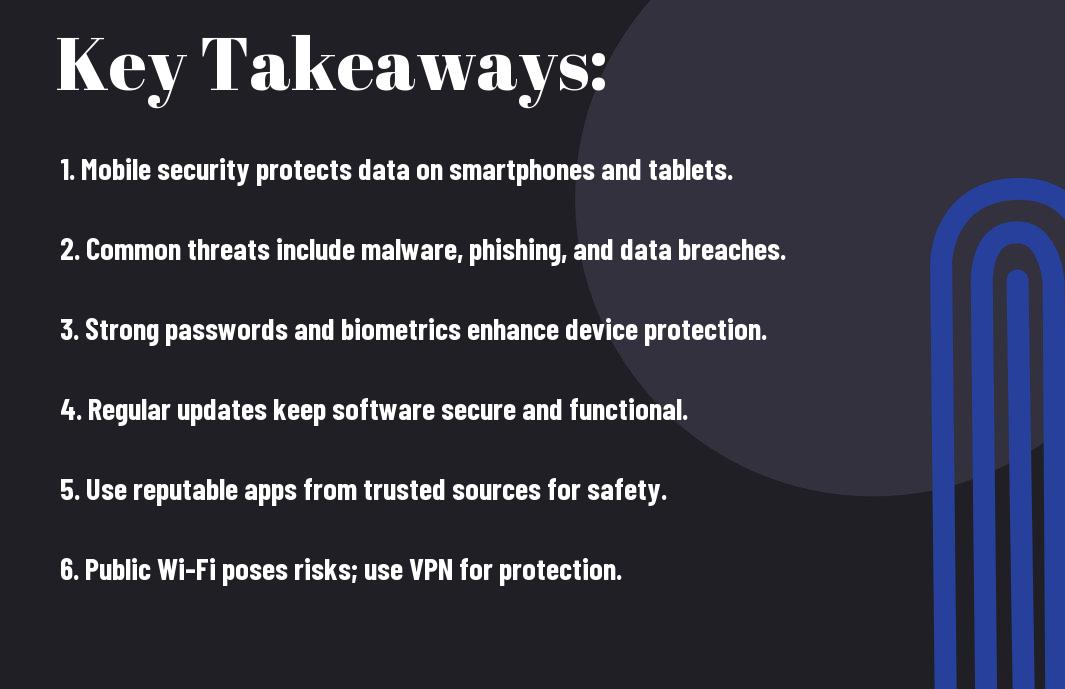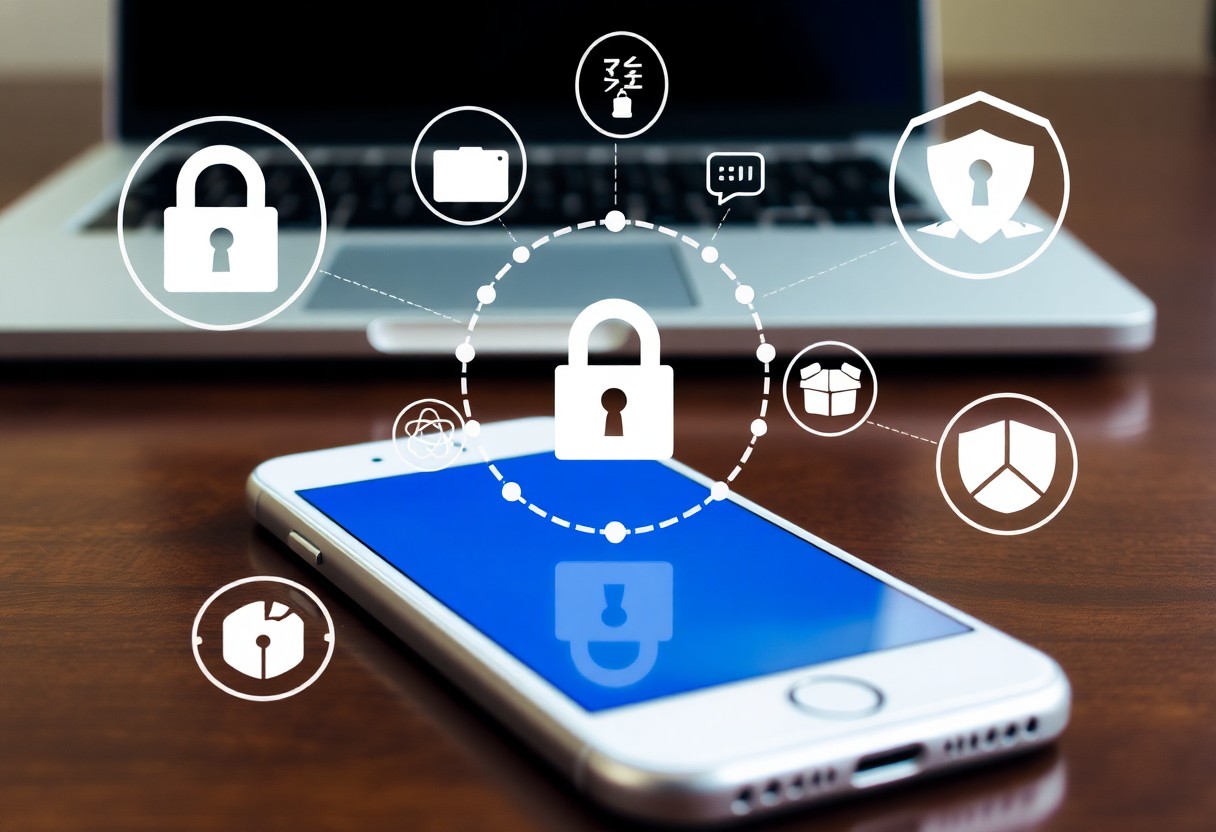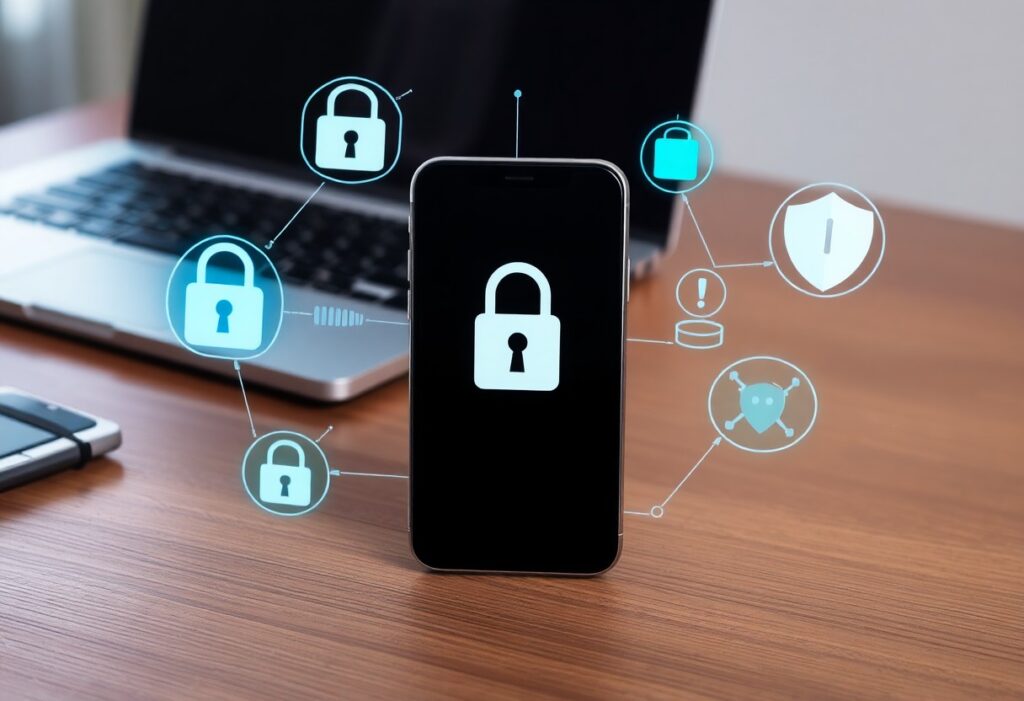There’s a growing need for robust mobile security as you rely on your devices more than ever for personal and professional activities. Understanding mobile security will help you protect your sensitive information from an array of potential threats. In this post, you will explore the benefits of securing your mobile devices, the various risks you might face, and best practices to ensure your data remains safe. Mastering mobile security is necessary for maintaining the integrity of your personal and professional information in today’s digital landscape.

Key Takeaways:
- Mobile security refers to the protection of personal and corporate information stored on mobile devices against various threats, such as malware, phishing, and data breaches.
- Implementing mobile security best practices, such as using strong passwords, enabling two-factor authentication, and regularly updating software, significantly reduces the risk of security incidents.
- Common threats to mobile security include unsecured Wi-Fi networks, fake apps, and lost or stolen devices, highlighting the importance of user awareness and proactive measures to safeguard sensitive data.
Understanding Mobile Security
Your mobile devices are imperative tools in your daily life, connecting you to work, friends, and the world at large. As you rely on smartphones and tablets for sensitive tasks such as banking, shopping, and communication, understanding mobile security becomes paramount. You must implement effective strategies to protect your personal information from various threats in an increasingly interconnected environment.
Definition of Mobile Security
For a clear understanding, mobile security refers to the protection of personal and organizational data stored on mobile devices from unauthorized access, data breaches, and other cyber threats. It encompasses a range of measures, including software solutions, user behaviors, and regulatory frameworks that aim to secure mobile communication and data exchange.
Importance of Mobile Security
Any device that connects to the internet can be susceptible to attacks, making mobile security vital in guarding your private information and maintaining your digital identity. Without it, you risk exposing sensitive data to cybercriminals, which can lead to identity theft, financial loss, and compromise of Personal Identifiable Information (PII).
Even a single security breach can have long-lasting implications for your finances and personal reputation. With the rise of mobile malware, phishing attacks, and data leaks, it’s imperative for you to prioritize security measures while using mobile devices. Maintaining awareness of potential threats and employing best practices can protect your information and give you peace of mind while navigating the digital landscape.

Common Threats to Mobile Devices
Assuming you use a smartphone or tablet, you face various threats that can compromise your personal information and device integrity. These threats can come in different forms, from malicious software to social engineering tactics, making it crucial for you to stay informed and proactive in safeguarding your mobile devices.
Malware and Viruses
To protect your mobile device, it’s crucial to understand that malware and viruses can infiltrate your system through seemingly harmless apps and links. These malicious programs can steal your data, track your activities, or even hijack your device, leading to significant security issues.
Phishing Attacks
Any time you receive unsolicited messages urging you to click on links or provide personal information, you risk falling victim to phishing attacks. These deceptive tactics aim to trick you into revealing sensitive data, often by mimicking trustworthy organizations.
Understanding the mechanics of phishing attacks can help you identify and avoid them. Cybercriminals often use email or text messages that appear legitimate, designed to instill a sense of urgency. They may direct you to counterfeit websites that look real but are intended to harvest your credentials. Always scrutinize the sender’s information and avoid clicking on links in questionable messages to protect your personal data.
Benefits of Strong Mobile Security
To ensure a safe digital experience, investing in strong mobile security offers numerous benefits. It safeguards your sensitive information from malicious actors, allowing you to use your device with confidence. By implementing robust security measures, you not only protect your personal data but also enhance your overall mobile experience, leading to greater peace of mind in an increasingly connected world.
Protection of Personal Information
On a daily basis, you access a wealth of personal information on your mobile device, from banking details to social media accounts. Strong mobile security protects this data from unauthorized access and potential breaches, ensuring that your information remains confidential and secure.
Enhanced Privacy and Data Security
The use of strong mobile security promotes enhanced privacy and data security, which is vital in an environment where cyber threats are rampant. With effective measures in place, you can prevent data leakage, unauthorized app access, and phishing attacks, thus fortifying your digital footprint.
Strong mobile security not only empowers you to choose which applications access your data but also encrypts sensitive information to thwart cybercriminals. By actively managing your privacy settings and utilizing tools like VPNs, you can significantly reduce vulnerability to hacking attempts and ensure that your digital interactions are safe. This proactive approach fosters a secure online environment, enabling you to engage freely with your applications and communications while reducing the risk of data exposure.
Best Practices for Mobile Security
Keep your mobile devices secure by adopting effective practices that minimize vulnerabilities. Focus on maintaining vigilance in your digital habits, employing security tools, and regularly assessing your device for potential threats. By incorporating these measures, you can significantly enhance the protection of your personal information and maintain the integrity of your mobile experience.
Regular Updates and Patching
Across all mobile platforms, updates and patches are fundamental in addressing security vulnerabilities. Ensuring that your operating system and apps are up to date means you benefit from the latest security enhancements, reducing the risk of exploitation from malicious software. Set your device to automatically update or make it a habit to check for updates frequently.
Use of Strong Passwords and Biometrics
Across your mobile applications, utilizing strong passwords combined with biometrics offers an effective security layer. Strong passwords should be complex, ideally a mix of uppercase, lowercase, numbers, and special characters. Furthermore, incorporating fingerprint scanning or facial recognition adds an additional layer of protection that is difficult for attackers to bypass.
Regularly auditing your password strength and updating passwords can keep your accounts secure. It is advisable to use a password manager for better management, allowing you to create unique passwords for each service without the risk of forgetting them. Biometric options, such as fingerprint sensors or facial recognition, are typically faster and more secure than traditional passwords, reducing the chance of unauthorized access. Embracing these practices can significantly protect your device and personal data.

Mobile Security Tools and Applications
Once again, securing your mobile devices requires a blend of effective tools and applications to protect your personal data from potential threats. You can utilize a variety of security solutions, including antivirus software, firewalls, and secure messaging apps, to create a formidable defense. Keeping these tools updated is vital to withstand evolving threats and ensure your mobile security remains robust and reliable.
Antivirus and Anti-malware Software
At the forefront of mobile security, antivirus and anti-malware software play a vital role in safeguarding your device from malicious software. These applications scan your device for any potential threats, providing real-time protection against viruses, spyware, and other harmful entities. By having this software installed, you can significantly reduce the risk of data breaches and keep your information safe.
Virtual Private Networks (VPNs)
Between using public Wi-Fi and accessing sensitive information online, protecting your online activities is paramount. A Virtual Private Network (VPN) creates a secure and encrypted connection between your device and the internet, ensuring that your data remains private and protected from unauthorized access.
But using a VPN is not just about privacy; it also helps you bypass geo-restrictions and access content that may be unavailable in your region. By masking your IP address, a VPN makes it difficult for third parties to track your online activities, providing you with an added layer of security while surfing the internet. With the rise in cyber threats, integrating a VPN into your mobile strategy is an vital step toward maintaining your digital security.
Future Trends in Mobile Security
Despite the continuous advancements in mobile technology, the landscape of mobile security is ever-evolving. As new devices and applications emerge, you must stay abreast of innovations to protect your data. Future trends will likely include more sophisticated authentication methods, enhanced encryption protocols, and a greater reliance on behavioral analytics to spot anomalies, all aimed at fortifying mobile security against potential threats.
AI and Machine Learning in Security
Against the backdrop of increasing cyber threats, artificial intelligence and machine learning are becoming pivotal in your mobile security strategy. These technologies can analyze massive volumes of data to identify patterns and anomalies, enabling faster threat detection and response. By automating security measures, you’ll be better equipped to anticipate potential attacks and protect your sensitive information.
Evolving Threat Landscape
Before you can safeguard your mobile device, it’s critical to understand the shifting threat landscape. Cybercriminals are continuously developing new tactics and techniques, exploiting vulnerabilities in apps and networks. With mobile devices becoming integral to daily life, their allure only increases for hackers and malicious actors.
Machine learning is actively being employed not just to defend against established threats but also to predict future vulnerabilities. As you navigate your digital life, it’s necessary to be aware that threats are evolving; malware, phishing attacks, and ransomware are becoming more sophisticated. Staying informed about the latest developments in mobile security will empower you to better protect your devices and data, ensuring a safer mobile experience.
Q: What is Mobile Security?
A: Mobile security refers to the protection of smartphones, tablets, and other portable devices from threats such as malware, hacking, and unauthorized access. It encompasses measures designed to secure both the hardware and software of mobile devices, ensuring the integrity and confidentiality of sensitive data stored on these devices. This entails using various tools and techniques, including encryption, secure passwords, and mobile device management solutions, to prevent security breaches.
Q: What are the benefits of implementing mobile security measures?
A: Implementing mobile security measures provides several benefits, including the protection of personal and corporate data from theft or loss. Enhanced mobile security helps to safeguard against identity theft, financial fraud, and data breaches. Furthermore, it fosters user trust by ensuring that sensitive information, such as payment details and personal communications, is kept secure. Organizations also benefit from mobile security as it maintains compliance with data protection regulations and reduces the risk of costly security incidents.
Q: What are common threats to mobile security, and how can they be mitigated?
A: Common threats to mobile security include malware, phishing attacks, and unsecured Wi-Fi networks. Malware can infiltrate devices through malicious apps or websites, while phishing attacks trick users into revealing sensitive information. Unsecured Wi-Fi networks can expose devices to eavesdropping and data interception. To mitigate these threats, users should install trusted security applications, avoid clicking on suspicious links, regularly update their operating systems and apps, and utilize VPN services when connecting to public Wi-Fi networks. Additionally, employing strong passwords and enabling multi-factor authentication can significantly enhance overall security.





